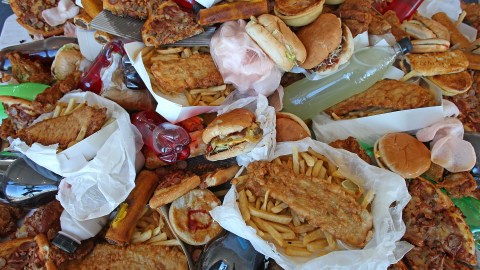Junk food and drugs: your body doesn’t know the difference

Junk food and drugs. Sounds like a typical Friday afternoon to me. But according to a 2015 study that is just recently making the rounds, researchers at the University of Michigan have found that your body doesn’t really know the difference between the two. There’s a scientific reason that “once you pop, you can’t stop.”
Shown a list of 35 foods, the initial 120 participants of the study were asked to identify which they had “problems” with, i.e. which foods they were most likely to binge on. Unsurprisingly, the most processed foods were the most problematic. All of the problem foods were high on the glycemic index, which is a polite way of saying they spike your blood sugar harder than a Terrell Owens touchdown. (How’s that for a sports reference/Big Think crossover?) Later on, 398 more participants were found via Amazon’s Mechanical Turk program. The results were practically the same.
The reason? Food scientists at the major food corporations (Frito Lay, for example) can dial in exactly what people find addictive—salty, crunchy, a little sweet—and serve it to you. These companies take out the good stuff like protein and fiber and give you a snack that’s tailor-made for addiction. Even rats get addicted to junk and snack food; that’s how universal the cravings are.
University of Michigan psychology professor Erica Schulte, the lead author the study, spells it out plainly in a press release, saying (emphasis mine):
This is one of the first studies to examine specifically which foods may be implicated in “food addiction,” which has become of growing interest to scientists and consumers in light of the obesity epidemic. Previous studies in animals conclude that highly processed foods, or foods with added fat or refined carbohydrates (like white flour and sugar), may be capable of triggering addictive-like eating behavior. Clinical studies in humans have observed that some individuals meet the criteria for substance dependence when the substance is food.
Needless to say, this food addiction is a big deal. Quite literally so. Obesity has reached epidemic proportions.
Perhaps a bag of Doritos should come with a warning label, a tactic that has been tried and proven to work very well in other countries. And, I mean, heck, warning labels and dire pictures on packages has worked well in cutting the number of smokers. Obesity kills millions and millions of people a year: it shouldn’t be too difficult to put some warning labels on addictive foods, right?
But our President is currently stripping the warning labels off of food and even going as far as to rescind Obama-era laws about showing calorie counts. C’est la vie. Stresses me out just writing about it. Kinda makes you want a delicious Snickers bar to take the edge off…





